
The U.S. Soybean Export Council (USSEC) recently met with the Honorable Prime Minister of Bangladesh Sheikh Hasina as part of a high-level delegation led by the U.S.-Bangladesh Business Council. The two country’s bilateral trade relations took center stage as the Prime Minister urged for FTA negotiations to begin between the two partners.
“Bangladesh is ready to commence a free trade agreement (FTA) negotiation with the U.S. at an a appropriate time,” commented the Prime Minister. “I can assure you of the best policy framework to ease our business and investment climates.”
The Prime Minister also indicated a special willingness to create special economic zone, dedicated solely to US companies — a concept that has been a hallmark of her administration.
Trade forms the backbone of relations between the two countries, with U.S. Soy playing a key role. In 2021, U.S. Soy represented nearly 21% of all U.S. exports to Bangladesh, and over 50% of all agricultural exports. This makes U.S. Soy among the most important U.S. exports to Bangladesh, along with airplanes. Energy is another sector where the U.S. plays a major role in advancing the relationship and constitutes the majority of foreign direct investment into the country, of which the U.S. is the single largest provider.

“If energy is the fuel for economic development, food is the energy for human development,” remarked Kevin Roepke, Regional Director for South Asia and Sub-Saharan Africa at USSEC. “The food and agriculture and energy sectors form the foundation for the bilateral relationships between the U.S. and Bangladesh.”
Jay R. Pryor, Vice President for Chevron’s business development and Chairman of the Board for the U.S.-Bangladesh Business Council echoed the sentiment. “Productive, predictable and constructive relations between the U.S. and Bangladesh are essential for U.S.-based companies to operate in Bangladesh and set the stage for an ‘investment and trade-driven’ economic strategy for the next 50 years of partnership.”
“This win-win mentality will enable Bangladesh’s vision for nutritional security and advance economic prosperity for the citizens of Bangladesh,” Roepke said. “U.S. Soy farmers and industry are honored, humbled and optimistic about partnering with Bangladesh.”

Additionally, private sector and industry investment advisor, Salman F. Rahman, commented the Bangladesh Government has keen interest in expansion of its agri-processing sectors. As Bangladesh is one of the most densely populated countries on the planet, value addition will play a key role in its agricultural sector.
“I informed them about the success of Bangladesh’s agriculture. I also urged (the U.S.) to bring modern technology to this sector,” remarked Rahman.
USSEC highlighted one outstanding success story in the context of agricultural technology transfer — the in-pond raceway systems (IPRS) for aquaculture. With investments from the Iowa Soybean Association, USSEC partnered with a company in Natore to build the first of its kind demonstration scale aquaculture IPRS in Bangladesh. Since then, interest has grown around the country for rapid scale expansion with several projects currently underway.
As Bangladesh grows into its vision to become a developed nation by 2041, USSEC is proud to be a partner in this transformation.
